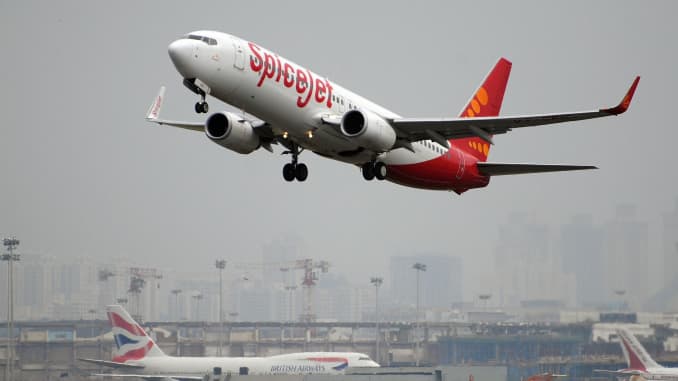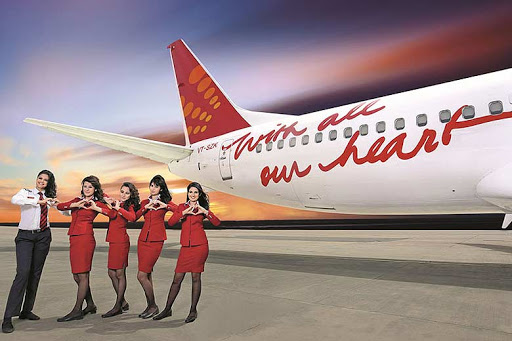- Indian low-cost carrier SpiceJet has asked the government for relief that will ease the strain on its cash flow, chairman and managing director Ajay Singh said Friday.
- More than 50% of employees will be on leave without pay in April and the airline is running a cargo business that’s generation some cash flow, according to Singh.
- India’s airlines are in crisis as the country’s extended lockdown measures to reduce the spread of the coronavirus has left all passenger planes grounded till at least May 3, leading to a depletion of cash reserves for the airlines.

Indian low-cost carrier SpiceJet has asked the government for relief to ease the strain on its cash flow as it seeks to navigate the challenges brought on by the coronavirus, chairman and managing director Ajay Singh said Friday.
SpiceJet is one of the largest airlines in India, based on the number of domestic passengers it carries.
Like other countries, India’s airlines are in crisis as the country’s extended lockdown measures to reduce the spread of the coronavirus has left all passenger planes grounded till at least May 3, leading to a depletion of cash reserves for the airlines.
The Indian government has consulted the aviation industry on its needs and is working on a relief package that is expected soon, Singh told CNBC’s Tanvir Gill in an interview.
“We’ve asked for some issues which relate to cash flow, which is, of course, in short supply at this time,” Singh said. “We have asked them to help out with some of the salary payments, we’ve asked them to help … with some of the airport charges.”
To be clear, there has not been any official announcements of a relief package for the aviation industry yet.

An Indian-operated SpiceJet Boeing 737-800 aircraft (foreground) takes off.Indranil Mukherjee | AFP | Getty Images
He added that the current crisis provides an opportunity for the Indian aviation industry to sort out some of the structural problems that have made it less competitive against its global peers.
That includes the high levies paid on aviation fuel that are not counted under the goods and services tax regime, according to Singh.
A struggling sector
Airlines around the world are struggling as the pandemic grounds most passenger air travel.
Large global carriers like Singapore Airlines and Emirates have grounded most, if not all, of their fleets. Others have applied for government grants to pay salaries to employees. Some, like Virgin Australia, have run out of cash and succumbed to restructuring.
WATCH NOWVIDEO02:45US airlines are burning cash on flights that ‘don’t make sense’: Boyd Group
The International Air Transport Association (IATA) said that airlines in the Asia Pacific are “in survival mode,” and are facing a liquidity crisis as they are expected to burn $61 billion of cash in the second quarter. India is one of several priority countries highlighted by IATA on Friday that needs to take action to help airlines maintain sufficient cash to tide them over this period.
Revenue for 2020 is set to decline by $11.22 billion for Indian airlines compared to a year earlier, according to IATA.
‘Resilient company’
For his part, Singh said SpiceJet is “an extremely resilient company” and that he is confident the carrier can get through the current crisis. He said the company is talking to lessors, who lease out planes used by SpiceJet, about payment deferrals on those leases.
More than 50% of the airline’s employees will be on leave without pay in April and the carrier is running a cargo business that’s generating some cash flow, according to Singh.
“We have very little cash going out at this time, given that the lease payments are all deferred. The employees are on leave without pay. We actually have very little cash going out. We have some cash coming in from the cargo operation, which is enough for us,” Singh said.
Singh added that the airline is also expecting compensation from Boeing over the 737 MAX aircrafts that have been grounded since last March, and is awaiting recertification. The compensation deal is in its final stages, he said.
Singh declined to say how much cash the airline will get from the planemaker but stated that it is “a significant amount of cash.”
Investors, however, remain skeptical. Shares for the publicly-listed SpiceJet are down more than 60% year-to-date.
